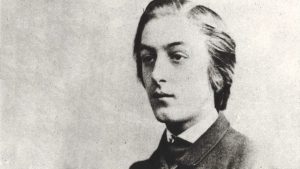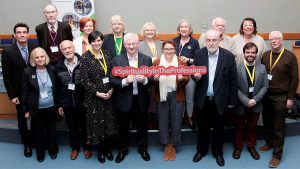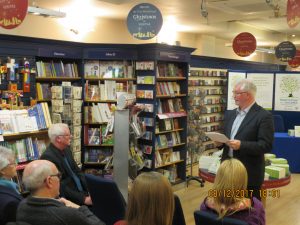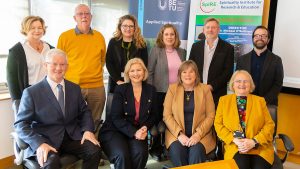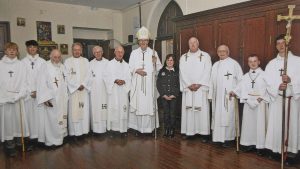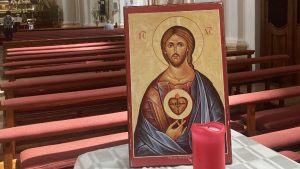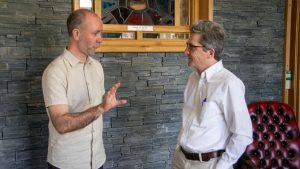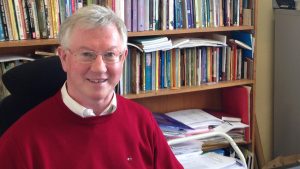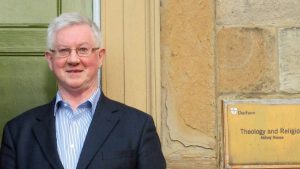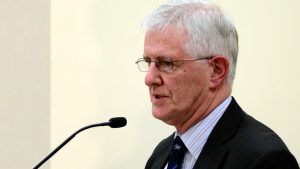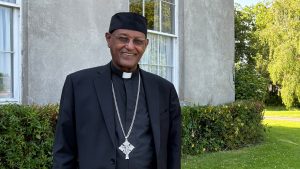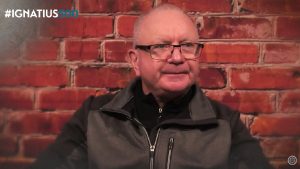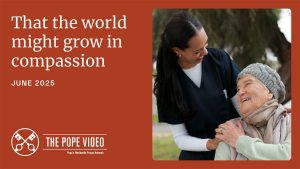Irish Jesuit honoured in the US

Michael O’Sullivan SJ, Director of the Spirituality Institute of Ireland (SpIRE), presided at a session of the American Academy of Religion (ARR), on Saturday 17 November, 2018. He was the first Irish Jesuit to preside at what is the largest international gathering of scholars of religion, spirituality, theology, and biblical studies in the world.
On the same day, the first official showing of A Jesuit with the People, which tells the story of Michael O’Sullivan as a missionary in Chile, was warmly received in New York by the American Irish Teachers Association (AITA) who described the film as both powerful and moving.
Michael travelled to Denver, Colorado for the meeting of the American Academy of Religion where he presided at the session, ‘Christian Spiritual Classics and Trauma, Evil, and Illness.’ The session explored the question of evil and suffering, the practice of spiritual affliction, and the imagery of wounds as signs of grace.
In her paper, ‘Wounded Bodies: Teresa of Avila’s Spirituality of Suffering,’ Dr Tara Soughers spoke in favour of Teresa of Avila’s embodied spirituality. She explained how in a dramatic encounter with a picture of Jesus being scourged at the pillar, Teresa was able to connect her own suffering with that of Christ after what she says was 20 years of spiritual dryness. It is because we are embodied, she held, that the image of Christ embodied is so powerful for us, that eye speaks to eye, wound to wound, and he is company for us. According to Dr Soughers, St Theresa’s suffering became an opening, a portal through which she could connect her life with that of Christ. Her suffering then became not something to be avoided, but something to be embraced for its capacity to join her to the suffering of Christ. However, she had little patience for those who imposed harsh penances. In her spirituality, we see not a glorification of suffering for the sake of suffering, but an acknowledgment that suffering can bring the Christian closer to Jesus, who suffered for their sake, according to Dr Soughers. It provides a way of understanding suffering in a positive, redemptive light, a way in which the trauma of life in the world can serve God’s purposes, and shared trauma can deepen relationships, she said.
Aline Gram, a PhD student at Graduate Theological Union, Berkeley, spoke about the power of the symbol in Julian of Norwich’s Parable of the Lord and the Servant. She brought two distinct thinkers, Julian of Norwich and Paul Ricoeur, into conversation in order to investigate the role of the symbol in Julian’s thought. She noted that for Julian, as it is for Ricoeur, the investigation of symbols provides a means by which to wrestle with the question of evil and the suffering caused by sin. It is the symbols in the ‘Parable of the Lord and the Servant’ that help Julian work through an aporia or sense of an internal contradiction that her questions about sin lead her to. Though Julian does not ultimately resolve this aporia, Gram contends that the prayerful work that she does with the ‘Parable of the Lord and the Servant’ leads her to greater theological insights. Such work reflects Ricoeur’s words, “the symbol gives rise to thought,” and it is his theory of metaphor that can illuminate the power that the ‘Parable of the Lord and the Servant’ has for Julian.
‘Disability Studies, Ignatian Spirituality, and Gerard Manley Hopkins: ‘Spiritual Affiliation’ as Both Spiritual Practice and Goal for Those Living with Chronic Illness,’ was the topic addressed Prof Frank McAloon, SJ, of Fordham University, New York. He said that for those living with chronic illness, as well as for those who love them or care for them, a conscious practice of “spiritual affiliation,” inspired by an Ignatian hermeneutic of “awareness, understanding, and action,” offers a context for bridging the degrees of separation among the disabled, chronically ill, and others. Professor mcAloon SJ’s work is grounded in the critical methods of Disability Studies (medical, cultural, and theological critiques). He was also drawing upon interdisciplinary tools within the area of the academic study of Christian spirituality (biblical studies, history of mysticism, and Ricouer’s theory of interpretation). The professor proposed that “spiritual affiliation” offers the chronically ill and others a spiritual practice that deeply informs our way of being in the world, focusing upon love, hope, and justice, adding that this practice was modelled upon a spiritual appropriation of the life and writings of the 19th century English Jesuit poet G.M. Hopkins, who likely suffered from chronic Crohn’s Disease.



